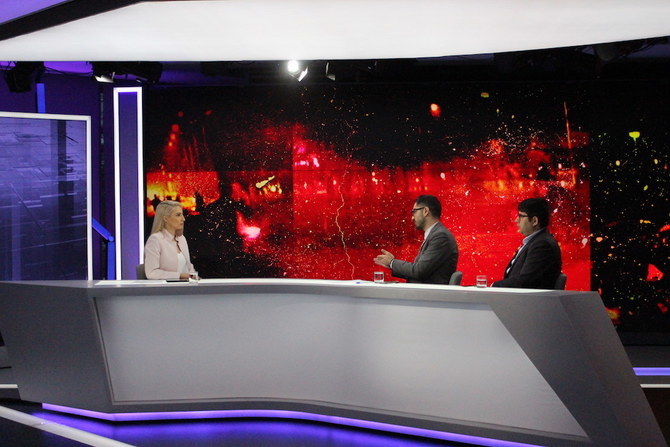LONDON: Iran is well known for suppressing protests and silencing critics within the country, but the regime is now extending its “distressing” abuses to Iranians living abroad.
Staff at Iran International TV, a news broadcaster based in west London, claim that not only have they personally faced a campaign of threats, but pressure has been applied on their families in Iran.
The station, which launched in May 2017, has quickly grown to become the most viewed Persian-language international broadcaster, tapping into a thirst for news from the Islamic Republic untarnished by the regime’s censors.
In particular, the channel has drawn audiences looking for coverage of the vast protests against clerical leaders last year that have now resumed in response to the shooting down of a Ukrainian passenger plane by the Iranian military.
“Of course, we are the victim of our success as well, in a way,” Sadeq Saba, editor and presenter at the channel told Arab News. “We have been very successful in covering the protests in Iran, after the Iranian regime brutally suppressed them.”
Problems for the TV station’s staff began when demonstrations erupted in hundreds of cities across Iran in November last year over a hike in petrol prices. Reuters reported that 1,500 protesters were killed, and thousands arrested.
“The Iranian intelligence ministry, which is a notorious organization, summoned families of my colleagues in Iran,” Saba said. “Within a few days, more than a dozen colleagues were affected, their mothers, fathers, siblings were summoned to intelligence ministry offices in Tehran and other cities.”
The veteran journalist said the authorities put pressure on his colleagues and told them “if you don’t resign from Iran International, they will make sure that they bring us back to Iran by force. I don’t think this is something they can do, but this is my opinion sitting in the safety of London, but if you are an elderly mother in a remote part of Iran and intelligence ministry officials tell you ‘if your loved one does not quit Iran International we will bring her or him back to Iran by force from anywhere in the world,’ you would be very distressed.”
Saba added that both he and his colleagues “strongly condemned” what the regime had done to their families, who were “innocent and should be left alone. We are not hostile to the Iranian regime, we are not their enemies, we are just a news channel, and we are professional journalists, and we believe in our principles and ethics of journalism and we are doing a simple job.”
The channel, which is privately funded, was set up as the first 24-hour Persian news channel and already it has covered major events in Iran.
It employs about 200 staff and has several bureaus around the world except, of course, in Iran.
“We would have loved to have a bureau and have correspondents there, but the Iranian authorities, obviously, don’t permit Persian-language channels to have bureaus in Iran,” Saba said.
The channel uses “citizen journalists” in Iran to aid with their coverage of major events. During the protests in November, they received thousands of videoclips and material, some with content so “heartbreaking and demoralizing” they could not be aired.
“The Iranian authorities do not talk to us, but we make sure that their point of view is also aired,” added Saba, who hosts the weekly arts and culture program “Weekend with Sadeq Saba.”
However, he noted that due to the regime’s policies, its hostilities with the US, and “for many other reasons,” the Iranian population was very politicized.
“Even boys and girls from a young age become willy-nilly interested in politics,” Saba said, adding that they particularly wanted to know what the opposition and analysts were saying.
Saba, who formerly served as the head of BBC Persian, said that the reason for the broadcaster’s success was because it had gone someway to filling this vacuum.
“Within three years, Iran International has become the number-one channel among all other Persian-language broadcasters, from BBC Persian service, Voice of America Persian, and Radio Free Europe Persian service, which is called Radio Farda,” Saba added.
It also operates on all social media platforms, and according to data provided by the channel, its followers are significantly greater in number than competitor channels.
During the protests, the Iranian regime shut down Internet services in the country. Saba said that over the same period Iran also jammed Iran International’s satellite signal, forcing the broadcaster to make a complaint with the UK’s communications regulator.
In response, the channel set up a radio station as well to reach those who lived in remote areas or during times of blackouts.
Since its launch, the channel has had a string of major stories involving Iran to get its teeth into, providing extensive coverage of the attacks on Saudi Arabia’s oil refineries and oil tankers, the death of top Iranian commander Qassem Soleimani, as well as Iran’s involvement in Syria, Lebanon, Iraq and Yemen.
The coverage has brought recognition, with Iran International recently nominated for the Best International Channel of the Year award by the Association for International Broadcasting (AIB).
“This is a forum for everybody, if you want to know what is happening about Iran and you are a Persian speaker, you watch this channel, and we would like to continue that,” he said.
The channel also has plans to expand its services to include more English and Arabic content.




































